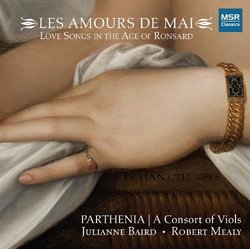| All Artists: Parthenia: A Consort of Viols;Julianne Baird (soprano);Robert Mealy (violin) Title: Les Amours de Mai: Love Songs in the Age of Ronsard Members Wishing: 0 Total Copies: 0 Label: MSR Classics Original Release Date: 1/1/2010 Re-Release Date: 12/1/2009 Genre: Classical Styles: Chamber Music, Historical Periods, Classical (c.1770-1830) Number of Discs: 1 SwapaCD Credits: 1 UPC: 681585130421 |
Search - Parthenia: A Consort of Viols;Julianne Baird (soprano);Robert Mealy (violin) :: Les Amours de Mai: Love Songs in the Age of Ronsard
 | Parthenia: A Consort of Viols;Julianne Baird (soprano);Robert Mealy (violin) Les Amours de Mai: Love Songs in the Age of Ronsard Genre: Classical
France in the sixteenth and early seventeenth century was not perhaps the calmest place to make music. Throughout this time, the country was riven by dynastic struggles and wars of religion; assassinations, violent riots, ... more » |
Larger Image |
CD Details
Synopsis
Product Description
France in the sixteenth and early seventeenth century was not perhaps the calmest place to make music. Throughout this time, the country was riven by dynastic struggles and wars of religion; assassinations, violent riots, and massacres were not uncommon events. But amidst all this horror, there were songs and dances being made that are marked by a graciousness, a balance, and a wonderful sense of lightness characteristic of the French Renaissance. One can see the same effect in the Louvre that was being built at this time: Italian Renaissance ideas of symmetry, order, and harmonious proportions are realized in a particularly French way to produce an effect of exceptional grace and elegance. The texts that the composers of the French Renaissance chose to set are those from the new generation of poets that were coming of age around them, in particular the poets known as the Pléiade. Most prominent among this constellation was Pierre de Ronsard, who deftly combined a sumptuous vocabulary with graceful imitations of classical metrical patterns to make some of the most memorable lyric poetry of the Renaissance. His works, especially those composed in the decade between 1550 and 1560, caught the ear of composers throughout Europe. The poetic achievements of Ronsard and his contemporaries were matched by an exceptionally talented generation of French composers. Like the architects, the painters, and the poets of France, these composers created their own distinctive styles out of various international elements. Combining the great tradition of well-wrought Flemish counterpoint with newer developments in Italian madrigals, they found a uniquely French Renaissance musical language, one that at times consciously emulated the classical verse forms of the poets they set. PARTHENIA, hailed by The New Yorker as one of the brightest lights in New York s early-music scene, is a dynamic ensemble exploring the extraordinary repertory for viols from Tudor England to the court of Versailles and beyond. Since 1989, this critically acclaimed, New York-based viol consort has been bringing ethereal, spirited, and virtuoso performances, enhanced by a remarkable sense of ensemble, to delighted audiences across the United States and Europe. The group collaborates regularly with the world s best early music specialists and has been featured in prestigious festivals and concert series such as Music Before 1800, Maverick Concerts, Monadnock Music, Miller Theatre at Columbia University, the Arizona Early Music Society, Connecticut Early Music Festival, the Amherst Early Music Festival, and the Regensburg Tage Alter Musik, and numerous times on both radio and television. Noteworthy among Parthenia s inventive programs have been presentations of the complete viol fantasies of Henry Purcell at the Cathedral of St. John the Divine, the complete instrumental works of Robert Parsons at Columbia s Miller Theatre, as well as the popular touring program When Music & Sweet Poetry Agree, a celebration of Elizabethan poetry and music with actor Paul Hecht. Parthenia performs often at The Metropolitan Museum of Art, both in Grace Rainey Rogers Auditorium and in the Museum s Medieval Sculpture Hall, and appeared in conjunction with the exhibition Searching for Shakespeare at the Yale Center for British Art. Parthenia has commissioned, premiered and recorded many new works by composers such as Phil Kline, Brian Fennelly, Will Ayton, Kristin Norderval, Max Lifchitz, David Glaser, Frances White, Paul Richards, Randy Sandke, and Nicholas Patterson. Upcoming projects include a premier of a work by Richard Einhorn with mezzo-soprano Jacqueline Horner- Kwiatek. Parthenia has recorded Within the Labyrinth, Parthenia Sampler, A Reliquary for William Blake, and Trumpet after Dark, with jazz trumpeter Randy Sandke.

 Track Listings (33) - Disc #1
Track Listings (33) - Disc #1